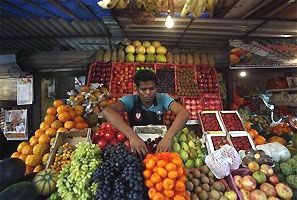Softening of global commodity prices might not help much
Wholesale Price Index (WPI)-based inflation might breach the six per cent-mark in the coming months, against 5.79 per cent in July, owing to the rupee’s fall. In the three months till June, WPI-based inflation stood within the Reserve Bank of India’s (RBI’s) comfort zone of four-five per cent. In its monetary policy review last month, RBI had said it would try to restrict inflation to five per cent by the end of this financial year.
In the three months till June, WPI-based inflation stood within the Reserve Bank of India’s (RBI’s) comfort zone of four-five per cent. In its monetary policy review last month, RBI had said it would try to restrict inflation to five per cent by the end of this financial year.
“The impact on inflation would be seen in a period of time, not in the immediate month. It depends on what level exchange rates settle at,” said Madan Sabnavis, chief economist, CARE Ratings. He added there would be a 0.5-1 per cent impact of imported inflation in the coming months, which could lead to WPI-based inflation exceeding six per cent.
However, some said due to softening of global commodity prices, the impact could be neutralised. “We import a lot of fertilisers; global fertiliser prices have really fallen compared to the corresponding period last year. This would, more or less, compensate for the kind of depreciation the rupee has seen,” said Devendra Pant, chief economist, India Ratings. He said a lot depended on how much of the burden of oil imports was passed on to consumers.
Soumya Kanti Ghosh, chief economic advisor, State Bank of India, said the softening of international commodity prices wouldn’t help much. “Even if there is softening on the international prices front, the impact of the falling rupee would be felt on inflation, as the rupee has crossed all limits.” Ghosh said inflation might even exceed six per cent soon and cross 6.5 per cent after September.
Shubhada Rao, chief economist, YES Bank, said: “We expect WPI inflation to touch 6.5 per cent in March-end. However, we are looking to revise it upwards further.”












 © 2025
© 2025